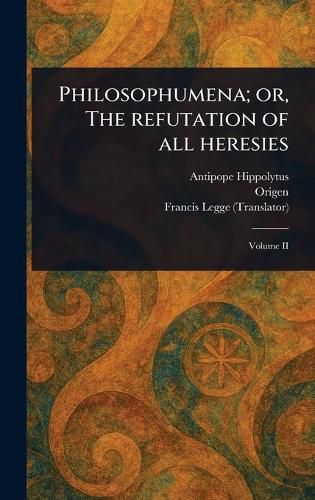Readings Newsletter
Become a Readings Member to make your shopping experience even easier.
Sign in or sign up for free!
You’re not far away from qualifying for FREE standard shipping within Australia
You’ve qualified for FREE standard shipping within Australia
The cart is loading…






This title is printed to order. This book may have been self-published. If so, we cannot guarantee the quality of the content. In the main most books will have gone through the editing process however some may not. We therefore suggest that you be aware of this before ordering this book. If in doubt check either the author or publisher’s details as we are unable to accept any returns unless they are faulty. Please contact us if you have any questions.
Hippolytus's "Philosophumena, Volume 2: Refutation of all Heresies" offers a vital glimpse into the theological landscape of the early Church. This historical text meticulously details and refutes various Christian heresies prevalent in the first few centuries AD. As a significant work in early Christian history and theology, it provides invaluable insight into the challenges faced by the nascent Christian community as it grappled with differing interpretations of doctrine.
Hippolytus, a prominent figure in early Christianity, meticulously examines a range of alternative beliefs, offering a comprehensive critique rooted in his understanding of orthodox Christian teachings. This volume serves as an apologetic work, defending core Christian tenets against perceived deviations. Students of religious history, Christian theology, and the early Church will find this a compelling and informative resource. "Philosophumena" remains an essential text for understanding the development of Christian doctrine and the historical context in which it emerged.
This work has been selected by scholars as being culturally important, and is part of the knowledge base of civilization as we know it.
This work is in the public domain in the United States of America, and possibly other nations. Within the United States, you may freely copy and distribute this work, as no entity (individual or corporate) has a copyright on the body of the work.
Scholars believe, and we concur, that this work is important enough to be preserved, reproduced, and made generally available to the public. We appreciate your support of the preservation process, and thank you for being an important part of keeping this knowledge alive and relevant.
$9.00 standard shipping within Australia
FREE standard shipping within Australia for orders over $100.00
Express & International shipping calculated at checkout
This title is printed to order. This book may have been self-published. If so, we cannot guarantee the quality of the content. In the main most books will have gone through the editing process however some may not. We therefore suggest that you be aware of this before ordering this book. If in doubt check either the author or publisher’s details as we are unable to accept any returns unless they are faulty. Please contact us if you have any questions.
Hippolytus's "Philosophumena, Volume 2: Refutation of all Heresies" offers a vital glimpse into the theological landscape of the early Church. This historical text meticulously details and refutes various Christian heresies prevalent in the first few centuries AD. As a significant work in early Christian history and theology, it provides invaluable insight into the challenges faced by the nascent Christian community as it grappled with differing interpretations of doctrine.
Hippolytus, a prominent figure in early Christianity, meticulously examines a range of alternative beliefs, offering a comprehensive critique rooted in his understanding of orthodox Christian teachings. This volume serves as an apologetic work, defending core Christian tenets against perceived deviations. Students of religious history, Christian theology, and the early Church will find this a compelling and informative resource. "Philosophumena" remains an essential text for understanding the development of Christian doctrine and the historical context in which it emerged.
This work has been selected by scholars as being culturally important, and is part of the knowledge base of civilization as we know it.
This work is in the public domain in the United States of America, and possibly other nations. Within the United States, you may freely copy and distribute this work, as no entity (individual or corporate) has a copyright on the body of the work.
Scholars believe, and we concur, that this work is important enough to be preserved, reproduced, and made generally available to the public. We appreciate your support of the preservation process, and thank you for being an important part of keeping this knowledge alive and relevant.